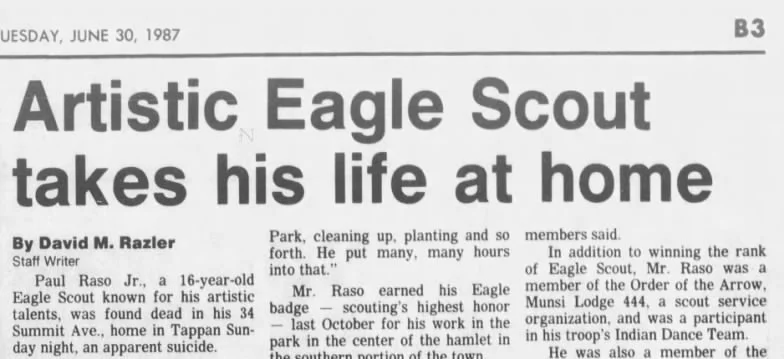Echoes of Missing Men
“Whatsoever I've feared has come to life
And whatsoever I've fought off became my life
Just when every day seemed to greet me with a smile
Sunspots have faded, now I'm doing time”
- Soundgarden, "Fell on Black Days”
In 1981, I “worked” my first summer with the Cub Scouts at Camp Bullowa in New York. As an unpaid aide, I should have been helping in one of the activity areas. Instead, I was assigned as a Den Chief to fill in missing positions in the staff. Because the shortage of counselors was severe, I was placed in charge of a group of Webelos, the oldest boys at the camp. At 13 years old, I was responsible for 12 energetic boys who were only a couple of years younger than me.
The Camp Director’s trust proved well placed. By the end of the week, I was secure enough in the role that I ventured away from the confines of camp to take them on a hike where a close-up encounter with a deer and its fawn instantly brought a group of energetic 11-year-olds to total amazed silence. At the weekend family campfire, I was called up repeatedly to collect my den’s awards for the day’s competitions.
Paul was one of the younger boys in the group, but his demeanor stood out to me. He was quieter than his den mates and usually close to my side. He was the kind of kid whose face revealed his intensity, yet whose smile came quickly with success.
I ran into Paul a few years later at a Boy Scout camping event. As the leader of my patrol, I was being carried on a make-shift stretcher as they showed off their first aid skills. As they carried me into one of the judging areas, I was greeted by a quiet “Hi Carl.” Paul, now a couple of years older, still had his confident smile. He introduced me to his father, who was working at the station with him.
What strikes me the most about that memory is how he interacted with his father. The teenage years are not always kind to father-son relationships, but if they had any deep-seated conflict, it was not apparent. They went through their assigned steps with ease.
Paul continued with the Boy Scout program and earned an Eagle Scout badge, a distinction earned by only 4% of Scouts, remarkable at his age. This boy, with quiet intensity, was a high achiever, certainly bound for great things.
The next time I heard about Paul was in a newspaper headline; he had died by suicide at just 16. The memory of him working side by side with his father haunted me as I read the article. Looking back now as a father, I cannot imagine how his parents endured such a devastating loss.
These memories came flooding back as I watched the induction of Soundgarden into the Rock and Roll Hall of Fame last week. While it was evident that the surviving members were beaming with pride over the recognition of their careers, there was also an element of sadness that hung over the ceremony; the absence of singer/rhythm guitarist/songwriter Chris Cornell was felt strongly.
Cornell died by suicide in 2017, just an hour after leaving the stage at a Soundgarden concert in Detroit. Widely considered to be one of the greatest Rock and Roll singers, he had battled depression for most of his life. This struggle was not only a fixture of his lyrics, but he was very open about it in interviews.
- Chris Cornell
Cornell’s words remind us how invisible these battles can be. Yet, for all of his honesty, there seemed to be a lack of acknowledgment of his cause of death at the ceremony. The euphemisms and phrases like he is “no longer with us” or “we lost him” were used, but the word “suicide” was never uttered. His daughter came the closest by mentioning “his struggles.”
In a world that has begun using phrases like “unalived himself” to avoid discussing the subject, this reluctance to use the word “suicide” should not be surprising. However, I wonder if the aversion was a missed opportunity.
Suicide does not occur in a vacuum. Who better to testify to the pain left behind than four bandmates who clearly loved their friend? Could they have reached one person at risk with their testimony of how much they wished Cornell had reached out when he felt the pull of the black hole of his depression. At the very least, could the producers of the show have sent out a lifeline to someone feeling helpless and in need of someone to talk to?
The 988 Lifeline provides 24/7, free, and confidential support for people in distress
If we learn to speak openly, perhaps fewer families will be left with the silence of missing men.
Dr. Diane Ravitch has recognized Carl Petersen, an education advocate, as “a valiant fighter for public schools.” A former Green Party candidate for the LAUSD School Board, Petersen is a passionate voice for special education, shaped by raising two daughters with severe autism. He recently relocated to the State of Washington to embrace his role as “Poppy” to two grandsons. Explore more at TheDifrntDrmr.



